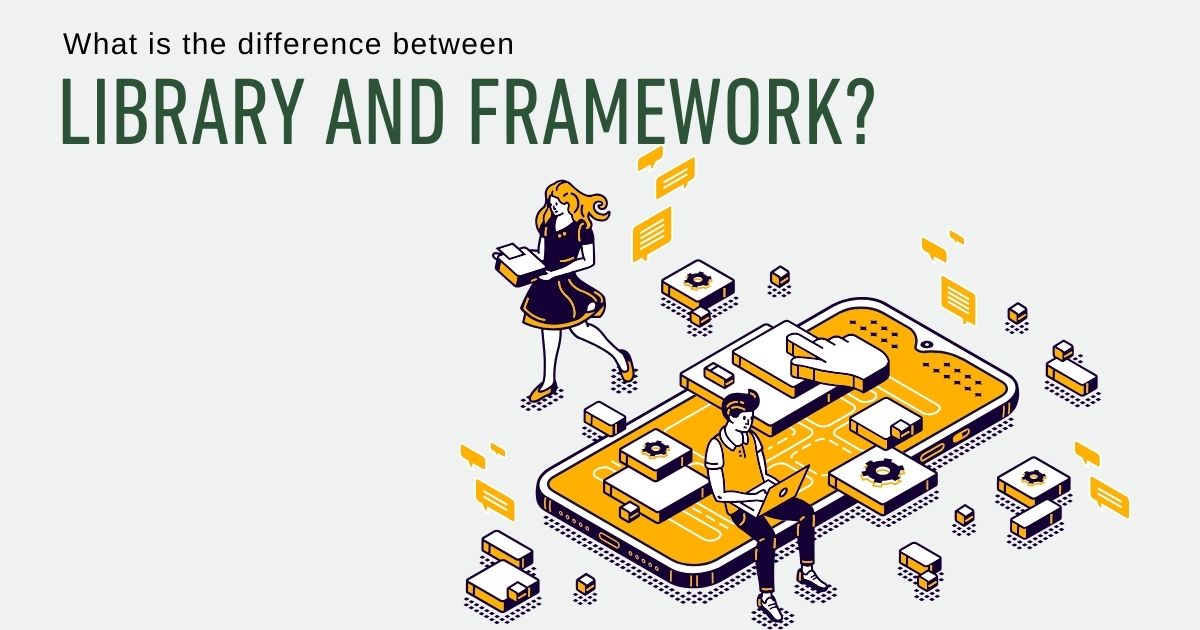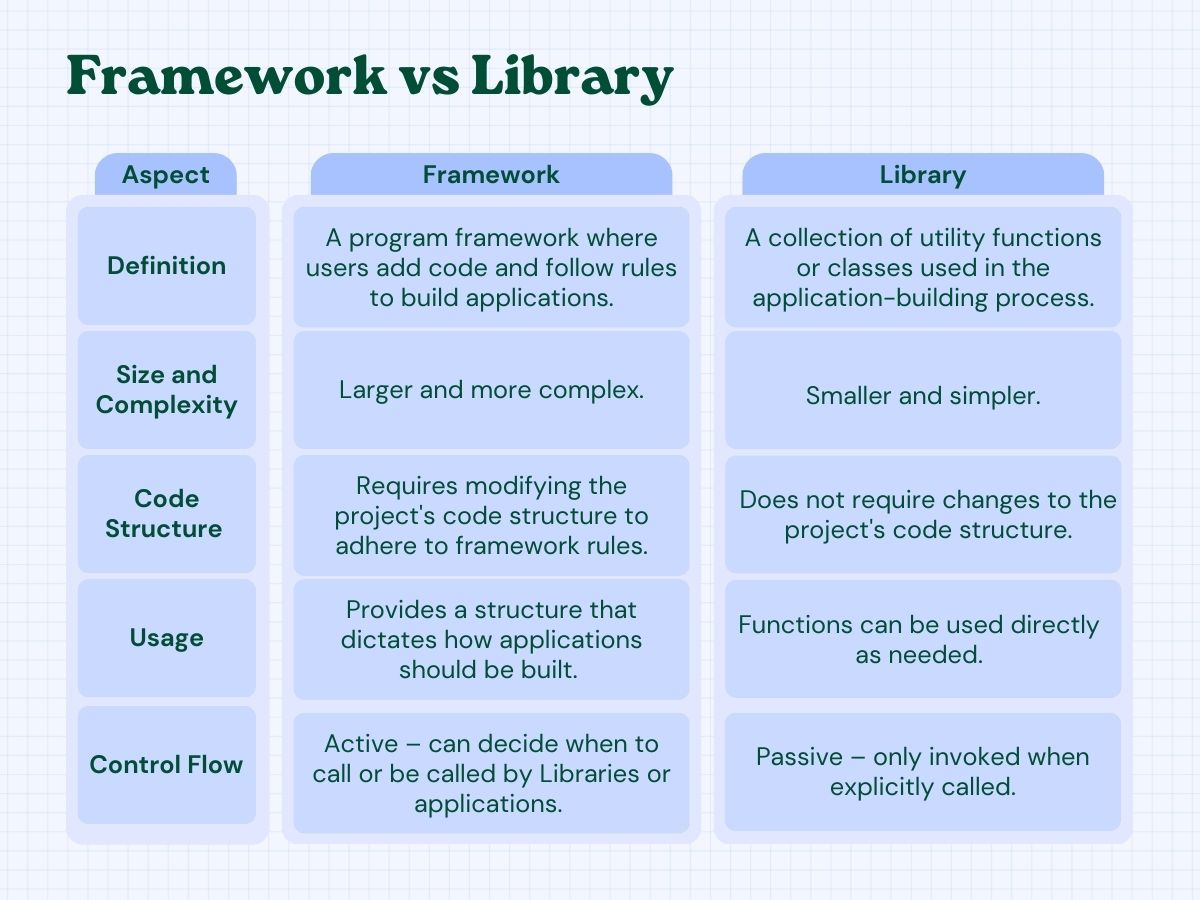What is the difference between Library and Framework?
In software development, the terms library and framework are often used interchangeably, yet they refer to distinct concepts that play different roles in coding and project architecture.
Have you distinguished the difference between Framework and Library? If you have the correct answer, it means you have grasped the most advanced way to build applications. If not, let's explore with Skilltrans right below this article.
What is Library?

A library in programming is a set of pre-built functions, methods, or code snippets, that are designed to perform specific tasks and can be reused in many different applications. Libraries help programmers save time and effort by providing common functions, such as data processing, user interface management, or file manipulation, without having to rewrite the code from scratch.
For example:
JQuery is a library that helps us manipulate the DOM.
LinqJS is a library that supports us in querying data more easily, simply, and quickly.
Advantages of Library
Libraries offer numerous advantages for developers:
Code reuse: Libraries offer available functions and methods. So, programmers can reuse code in many different projects without having to rewrite from scratch, saving time and effort.
Ease of use: Libraries are often designed with easy-to-understand programming interfaces. Programmers will quickly integrate and use without having to learn deeply about how they work inside.
Flexible: Libraries have a set of functions that programmers can use according to their needs. You have control over when and where to use the functions in the library.
Focus on specific tasks: Libraries often focus on solving certain problems, such as processing strings, arrays, HTTP requests, or manipulating the DOM.
Reduced programming errors: Using well-tested and widely used libraries reduces the risk of making common programming errors, as libraries are often thoroughly tested and optimized.
Disadvantages of Library
While libraries offer numerous benefits, they also come with certain drawbacks:
Dependencies on external libraries: When using multiple libraries, your project may become dependent on them. If the library is not well maintained or no longer updated, it may cause security issues or incompatibility with new technologies.
Lack of structural uniformity: Libraries do not dictate the overall structure of the application, leading to the use of too many different libraries that can make the source code inconsistent and difficult to maintain.
Performance: Some libraries may contain many features that are not needed by your application, increasing the file size and can affect performance, especially in web applications.
Learning how to use each library: Although libraries help reduce the workload, each library has its own syntax and usage. Programmers must learn how to use each library effectively.
Difficult to control the content inside: Since libraries are usually prepackaged code, you cannot easily adjust or change the way the library works internally if it does not provide enough features that you need.
What is a Framework?
A framework is a set of tools that helps programmers develop applications in an organized and efficient way. Unlike libraries, frameworks not only provide functions and methods but also define the control flow and overall structure of the application. When using a framework, programmers must follow the rules and structures that the framework sets out.
For example, Angular is a framework. The purpose of the Angular framework is to help users build single-page website applications easily and quickly. It focuses on developing the front end for web applications. Angular provides you with directives, services, data-bidding, filters, etc. To use Angular, we must follow its model and how it works. For example, a page will have an HTML part called a template, a processing part called a controller, rules about using $scope, isolate-scope, how to exchange data between pages. That means the Angular team has written libraries for you to reuse, along with a design pattern that you must follow to be able to build an application.
Advantages of Framework
Depending on the programming language and field, there are many different Frameworks. However, all of them bring the following basic benefits:
Open source and free: Most popular Frameworks are open source or available for use and allow the development of commercial applications without restrictions.
High efficiency: This can be considered the main reason why Frameworks were created. Reusability supports programmers avoid writing repetitive code. Common features and pre-built templates in the Framework help save maximum time and effort in the application development process.
High security: Popular Frameworks are often developed by many professional designers, even with support from large technology companies, ensuring that security risks are always taken care of and resolved.
Extensibility: Using a Framework, you can inherit the features it provides and extend by selectively overriding classes or methods. Frameworks permit programmers to write new functions within the scope of its general principles and standards.
Documentation and support: Most Frameworks provide online documentation or support. In addition, popular Frameworks also have large user communities ready to help you.
Disadvantages of Framework
However, Frameworks still have many disadvantages that you should consider before using:
It takes a lot of time to learn and master a framework.
The application size when using a framework is very large, a website can be up to several hundred MB of code without any content.
It is necessary to write code that complies with the common standards set by the framework.
It is not suitable for applications that are too small. For example, if you create a small application that displays the results of the 2022 World Cup, applying an entire framework is not necessary; instead, writing the code yourself will be faster.
What are the differences between Framework vs Library?

Framework and library have in common that they are both code written by others and we are the ones who use it in our project to make the most appropriate.
So how are Framework and Library different? Let's find out below:
Framework and Library both provide pre-written functions for us to reuse.
The framework is larger and more complex than the Library.
Using a Framework, you have to change the project's code structure according to the rules of that framework to be able to use the functions that the framework provides.
We can use the functions of the Library directly without changing the code structure of the project.
Framework can be understood as a program framework, users add code and follow the rules to create applications. The library only provides utility functions or classes for use in the application-building process.
Framework works actively. That is, it can make decisions to call or be called by certain Libraries or applications. The library works passively. That is, it is only called when we need to use it.
Another difference in using framework and library is the calling of code blocks (methods, functions). In the framework, the code in the framework will call your code, while with the programming library, your code calls the code of the programming library.
With the library, it is like the client/server model, the client will send requests to the server and the server will respond with the results. For example, when using the cURL programming library. You use a function in the cURL library, your PHP code will call this function in the cURL library. So, your code is the subject of the call and the programming library is passive.
When you use PHP frameworks like Laravel, for example, this relationship is reversed, the code in the framework calls your application code with a design pattern (that many people know about Inversion of Control). If you are familiar with Laravel, you will see that the framework code is put into index.php to manage the control flow while the code we write is put into controllers to create "behaviors" for the application.
Example to compare Framework vs Library
To help you understand better, we will take a real-life example to compare Framework with Library like this:
Framework
The framework is a model for a working computer. That is, a usable computer must include: screen, CPU, keyboard, mouse... You must install these components in order and according to the rules, such as the screen must be attached to the CPU case via the graphics card, the keyboard must be attached to the CPU case via the COM/USB port. The CPU case itself for it to work must have all the components: CPU chip, power supply, power cord, ... and they must be connected according to the rules and positions.
Library
COM/USB ports can be viewed as divided into many types to serve each of its functions. Power cords with power plugs (3-head, 2-head types), screws used to connect computer components…
Conclusion
Through this article, we hope you have understood what Framework vs Library is and the difference between them. Choosing to use a framework or library depends on your project needs and the level of control you need during application development.
Do you want to learn more about technology? A great thing is that you can sign up for courses from Skilltrans. Skilltrans has a variety of courses that are not limited to the technology field.

Meet Hoang Duyen, an experienced SEO Specialist with a proven track record in driving organic growth and boosting online visibility. She has honed her skills in keyword research, on-page optimization, and technical SEO. Her expertise lies in crafting data-driven strategies that not only improve search engine rankings but also deliver tangible results for businesses.



